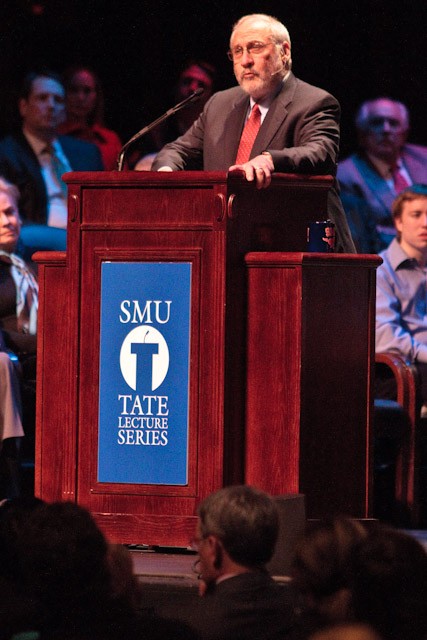
Nobel Laureate and Columbia University Professor Joseph Stiglitz speaks Tuesday evening inside McFarlin Auditorium as part of the Jones Day Lecture, presented by the Willis M. Tate Distinguished Lecture Series. (MICHAEL DANSER/The Daily Campus )
Nobel laureate and specialist of global economics Joseph Stiglitz shared his pessimistic view about the aftermath of the financial crisis last night at the SMU Tate Lecture Series’ Jones Day Lecture.
Stiglitz, who is currently a professor at Columbia University, admitted that “America is stuck and the only way to get out of this crisis is a second run of stimulus” to a sold out audience in McFarlin Auditorium.
He believes the sources of the global financial crisis stems from the bursting housing bubble, the excess supply of houses, banks going bankrupt, excess debt and a high unemployment rate.
Stiglitz is concerned that if unemployment rates do not lower quickly, America “will risk facing a new normal.”
America will have a difficult time getting people back into the labor market not only because of the high unemployment, but also because there is a demand for full time employment and the banks cannot afford to give loans to individuals or businesses.
“For the first time, the United States has faced long term unemployment,” Stiglitz said.
“Now 40 percent of those unemployed have been unemployed for over six months. Young people lose skills, which is a risk of depreciating the human capital.”
According to Stiglitz, the consequences of the financial crisis are affecting America’s relative position globally.
“We will still be the largest economy in the world, but our influence will be diminished and our ability to get what we want will be greatly diminished,” he said.
Audience member Rebecca Frank agreed with Stiglitz’s analysis of the future of the United States.
Her main concern is that Americans are “failing at who we can be collectively—collective wisdom and potential.”
Although Stiglitz realizes “trade with Mars is limited” and investments are constrained, he thinks growth expenditures will boost the economy, especially investments in technology.
An investment banker who attended the lecture agrees with Stiglitz on the factors of the crisis. However, he believes that Stiglitz is “relying on growth expenditures instead of putting faith into the supply side of the economy.”
“The American economy, as well as the world economy, was on an artificial respiration system,” Stiglitz said about the economy prior to the financial crisis.
According to him, now “we are stuck. We are not going to get the kind of money we need” to have any effect on the current global market.








